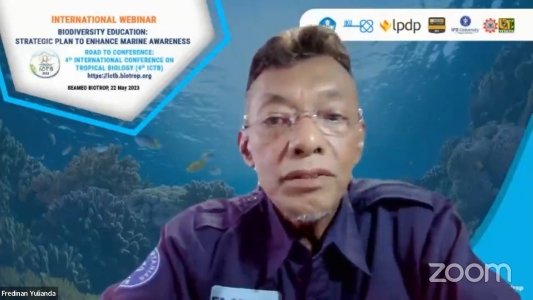Prof Fredinan Yulianda Explains Blue Economy Biodiversity For Marine Ecotourism

Indonesia is an archipelagic country that is overflowed by three important ecosystems, namely coral reefs, seaweed and mangroves. Its distribution on the coast and small islands in Indonesia are also wide. In fact, the area of Indonesia’s coral reefs are around 2.5 million hectares in total, 14 percent of the total area of the world’s coral reefs.
Prof Fredinan Yulianda, Dean of the Faculty of Fisheries and Marine Sciences (FPIK) IPB University said, the preservation of marine biodiversity such as coral reefs and others needs to be maintained by implementing the blue economy concept.
“The blue economy concept can be used as a basis for a more sustainable use of marine resources. Besides that, it can improve the economy and people’s welfare as well as the health and sustainability of marine ecosystems through its ecotourism potential,” he explained.
He continued, the application of the blue economy in ecotourism must provide an output in the form of increasing visitors’ insights and the sustainability of marine ecosystems. The variables that determine the success of this concept are the limited number of visitors and the prevention of damage to natural objects.
“The implementation requires four approaches, namely resource management, infrastructure management, visitor management and market management,” he explained in the International Webinar on Biodiversity Education ‘Strategic Plan to Enhance Marine Awareness’ which was held by Seameo Biotrop in the framework of the 4th International Conference of Tropical Biology (ICTB), recently.
With these four approaches, according to Prof Fredinan, the functions and services of marine ecosystems can be optimized in a sustainable manner based on their carrying capacity. However, components that need attention include integrated management of data, management, regulations and socio-economic aspects.
“Conservation efforts as one of the foundations of the blue economy, apart from functioning as protection, also provide benefits in the form of spillover benefits. The steady flow of fish stocks from conservation areas can greatly contribute to fisheries,” he added.
Prof Fredinan said, the application of biodiversity conservation is not only limited to conservation areas, but applications to all areas with a more sustainable resource management approach. (MW/Rz) (IAAS/BKU)


